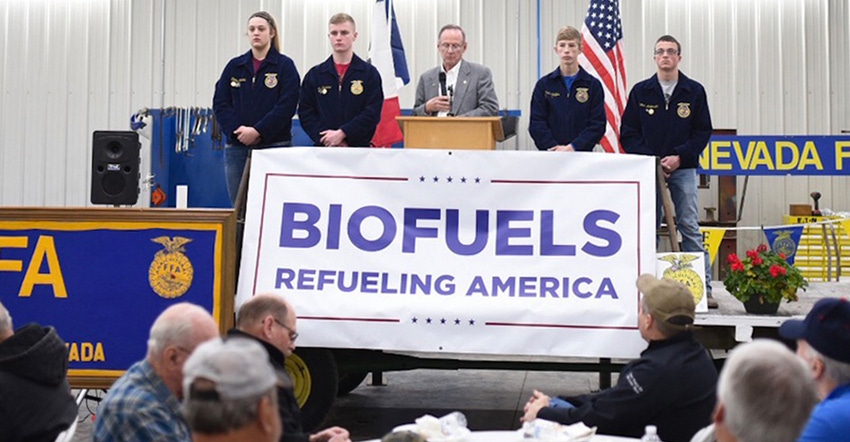
The battle being waged over renewable fuel continues. The oil industry is fighting producers of ethanol and biodiesel for market share, and the most recent skirmish has both sides pressuring the White House to broker a deal. Big Oil wants the Trump administration to put a cap on the price of certificates oil refiners must purchase if they are unable to blend biofuels.
The certificates, known as Renewable Identification Numbers, are proof a gallon of ethanol or biodiesel was purchased for blending. RINs are traded on the open market and can fluctuate in price; refiners say RIN prices are too high. The federal Renewable Fuel Standard requires petroleum companies to blend a certain amount of ethanol and biodiesel into the nation’s motor fuel supply each year.
In exchange for a price cap on RINs, the biofuels industry could offer blends of 15% ethanol year-round. Currently, E15 can’t be sold in some markets in summer to use in vehicles not equipped to burn higher blends. President Donald Trump has met with both sides to hammer out a deal. At one of the White House meetings, Jeff Broin, CEO of Poet, the nation’s largest producer of ethanol, was among those invited.
Opening market to E15
“The president made it clear he wants to see E15 nationwide,” Broin said. “That’s good for biofuels and agriculture. But he was also clear that the oil industry wants some RIN relief.” Broin said opening the market to E15 would provide incentive for the biofuels industry to expand and increase the amount of ethanol available and, along with it, the number of RINs.
EPA Administrator Scott Pruitt said his agency can solve the problem, but he hasn’t decided on a solution yet.
USDA Secretary Sonny Perdue has suggested Congress should handle this issue. Broin thinks that’s not a good idea, as Congress would slow down the progress to achieving a resolution.
Sen. Charles Grassley, R-Iowa, also wants Congress out of the RFS and doesn’t want any changes to it. “These changes suggested by the oil industry would be bad,” he said. “The RFS is working. If something ain’t broke, don’t fix it.”
Iowa gathering
Farmers, ethanol and biodiesel producers, and others supporting biofuels gathered March 10 at the Bill Couser farm at Nevada. It was one of several rallies held across Iowa to hear about efforts by U.S. senators from oil-producing states who want to dismantle the RFS.
Sen. Ted Cruz, R-Texas, representing oil interests, has led efforts to put a price cap or waiver on RINs. Cruz is calling for the caps, even as oil companies are posting record profits while agriculture struggles.
“We need President Trump to hear from you,” said Bill Howell, addressing the rally at the Couser farm. Howell, manager of the Poet ethanol plant at Coon Rapids, noted, “We heard the president campaign here in Iowa and elsewhere, promising he would preserve the RFS and stand with farmers. This is his opportunity to do so. We’re calling on him to keep his promise.”
With low commodity prices, farmers are facing a fourth straight year of income decline; farm debt is rising. An Iowa State University study shows the Cruz oil refinery bailout plan would decrease corn prices by 25 cents per bushel. It would decrease soybean prices by 16 cents.
“Folks in Washington forget American-made biofuels play a pivotal role in our economy,” Howell said. “Biofuels support jobs and wages in rural communities. Biofuels grow domestic and international markets for ag commodities. Biofuels lift grain prices. For many farmers, biofuels can sometimes make the difference between breaking even and going broke.”

LETTER to trump: People attending the Iowa biofuel rallies signed a letter, telling President Donald Trump to stand strong with farmers and rural America, and maintain a strong biofuels policy.During the rally, biofuels supporters signed a letter to Trump asking him to stand by his promise to protect the RFS and put American-made biofuels first.

Also, addressing the rally was Charlie Good, owner of Good & Quick fuel station and convenience store in Nevada, selling biofuels to motorists. Richard Schwarck, president of Absolute Energy, an ethanol plant at St. Ansgar, also spoke.
Good and Schwarck attended one of the White House meetings. They described the meeting as “tense,” with Cruz and the oil industry on one side, and U.S. Sens. Joni Ernst and Charles Grassley and the biofuels industry on the other. Good and Schwarck say they are hopeful that E15 will eventually be sold year-round.
Biodiesel also affected
A study by the National Biodiesel Board finds capping the price of RINs would lead to a reduction of up to 300 million gallons of biodiesel volumes each year.
“That happens to be almost exactly what Iowa’s entire biodiesel industry produced last year,” said Grant Kimberley, executive director of the Iowa Biodiesel Board. “It would also lead to $185 million more in feed costs for livestock producers, likely leading to an increase in food costs for consumers, and 16 cents less per bushel of soybeans for farmers.”
Kimberley added, “Gutting the RFS would worsen the financial struggles farmers are already facing and push us even deeper into an ag recession. Biodiesel supports 64,000 American jobs, and the biodiesel sector has plants in just about every state. It supports the jobs of 2 million farmers as well.”
About the Author(s)
You May Also Like




